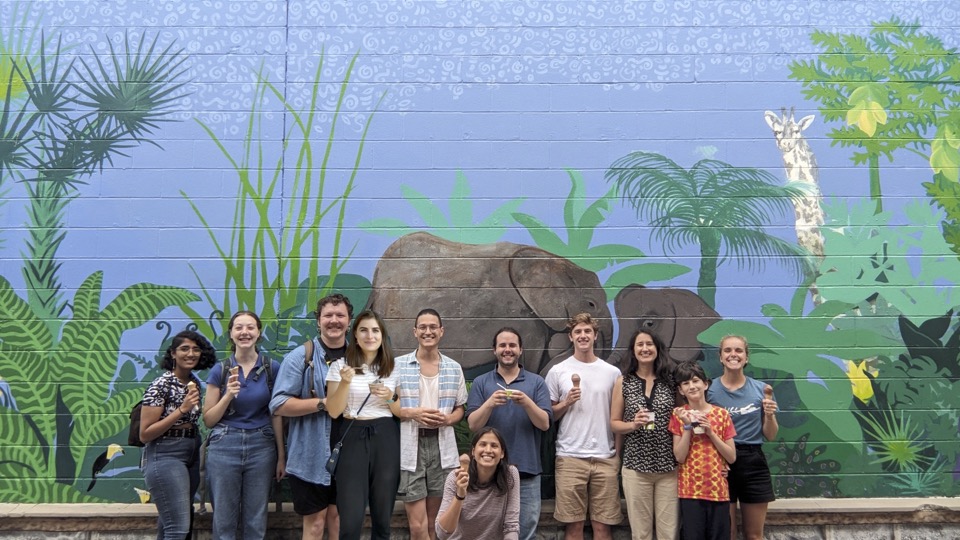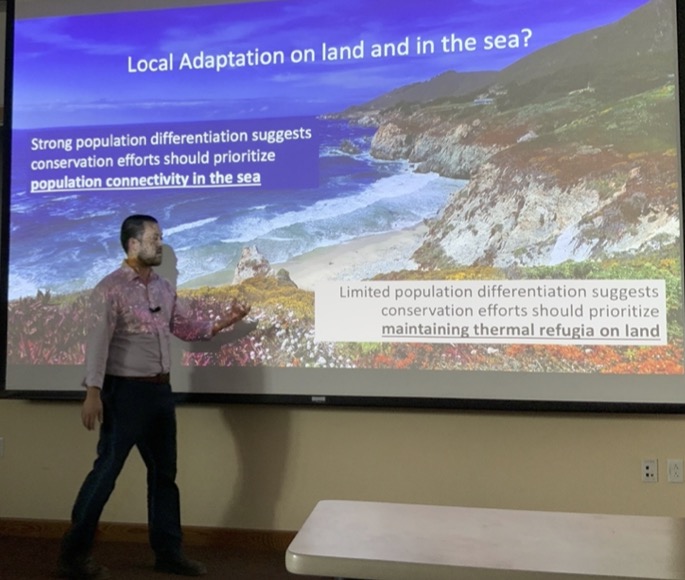
Melissa Pespeni
@mpespeni
Followers
223
Following
80
Media
5
Statuses
34
Joined November 2014
Take home: The tipping point between health and disease is likely shaped by host condition, low oxygen conditions, and microbial dysbiosis. These results are also supported by our field-sampled naïve, exposed, and wasting sunflower stars in Alaska:
frontiersin.org
Sea star wasting (SSW) disease, a massive and ongoing epidemic with unknown cause(s), has led to the rapid death and decimation of sea star populations with ...
0
0
0
New paper out today on Sea Star Wasting in Proc B @RSocPublishing – Longitudinal gene expression and microbiome data: visibly healthy stars = active immune and collagen systems + stable microbiome. Wasting stars = hypoxia + turnover to anaerobic microbes.
royalsocietypublishing.org
Epidemics are becoming more common and severe, however, pinpointing the causes can be challenging, particularly in marine environments. The cause of sea star wasting (SSW) disease, the ongoing,...
1
0
9
Beautiful and inspiring talk and visit with @chengsbrian. From atmospheric rivers, to oyster drills, to MPAs! Thanks for visiting @BiologyUVM!
0
0
8
New paper @FrontMarineSci – The microbiomes of Naïve, Exposed, and Wasting sunflower stars sampled in the wild in Alaska as the disease spread north implicate Vibrio and low oxygen conditions. Amazing collaboration among @QuestUvm trainees and AKDF&G!.
frontiersin.org
Sea star wasting (SSW) disease, a massive and ongoing epidemic with unknown cause(s), has led to the rapid death and decimation of sea star populations with ...
0
3
14
RT @DrRashidSumaila: Today is a big news day for ocean science and economics @UBC. See below. @ubcSPPGA @SSHRC_CRSH @KillamTrusts @TylerPr….
0
47
0
#SeaUrchin larvae don’t grow or survive well when exposed to compounds that leach from #plastics into the ocean. Surprise - the most detrimental effects were at intermediate doses! Project started by a curious undergrad and finished by Master @EmilyShore8!
0
1
4
Big picture take home: 1+1 ≠ 2 when it comes to global change adaptation!. Amazing collaborators!: .@reidbrennan @Jimmy_deMayo @planktonomics @vsbuffalo @Baumannlab1.
0
0
2
New paper! 25 gens of exptl evol of copepods - ambient, ocean acidification, warming, and combined -> warming is the strongest selective pressure, but the combination results in a unique synergistic response @PNASNews @BiologyUVM .See our cartoon abstract!
1
5
14
Congrats, Dr. Ashlock! In one week, @AshlockLauren defended their dissertation and lined up a postdoc! Lauren’s work explored the effects of pop, life history, and enviro history on copepod temp and salinity tolerance. The oceans thank you, Dr. Ashlock! @QuestUvm @BiologyUVM.
2
1
16
New paper @NatureComms! We show that rapid adaptation of #copepods to #GlobalChange leads to a loss of plasticity – costs revealed even w/ return to benign conditions Amazing collaborators @reidbrennan @Jimmy_deMayo @planktonomics @Baumannlab1.#UVMresearch.
nature.com
Nature Communications - Rapid adaptation will facilitate species resilience under global climate change, but its effects on plasticity are less commonly investigated. This study shows that 20...
1
10
40
25 generations of experimental evolution in copepods + genomics + beautiful analyses and visualizations show that adaptation to ocean warming and acidification is synergistic rather than additive. Check out our new preprint just up!.
biorxiv.org
Metazoan adaptation to global change will rely on selection of standing genetic variation. Determining the extent to which this variation exists in natural populations, particularly for responses to...
0
2
13
We measured fitness across 25 generations of experimental evolution to find “Rapid, but limited, zooplankton adaptation to simultaneous warming and acidification” Out this week @NatureClimate with @planktonomics and @reidbrennan! #UVMResearch #copepods .
0
8
28
Awesome new synthesis of global patterns in copepod thermal tolerance by @Matt_Sasaki just out! What a useful product of the pandemic! Thanks, Matt!.
0
0
1
#Copepods have slower pop. growth and slower sinking poop when they eat #microplastics. This may be bad news for the oceanic food chain and carbon settling. Emily Shore’s MS thesis @BiologyUVM just out in #Environmental #Pollution! Free PDF til Jul 23!
0
1
7
RT @QuestUvm: This UVM’s “Beyond Brave Spaces” conversation: QuEST director @mpespeni , UVM President @SVGarimella , Dr. Linda Schadler & M….
0
2
0
And said so well! Thank you, @big_data_kane !.
"Antiracism in science must be about much more than challenging the bigoted greybeards of our past.". I said what I said. New work for @sciam. #BlackIntheIvory.#BlackLivesMatter.#BlackMindsMatter.
0
0
1






